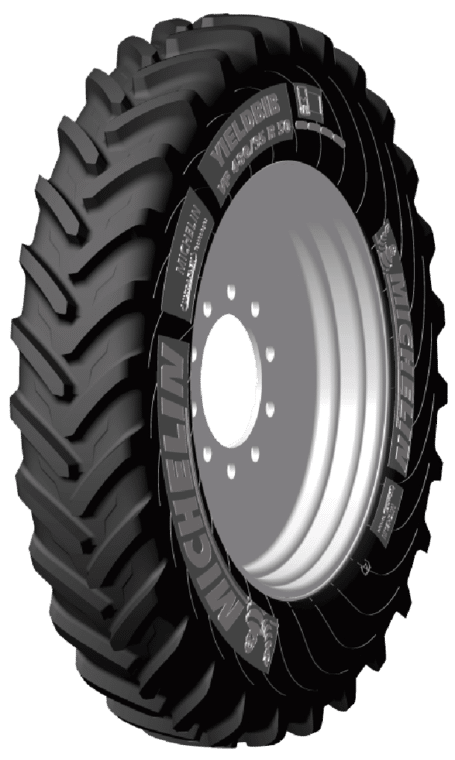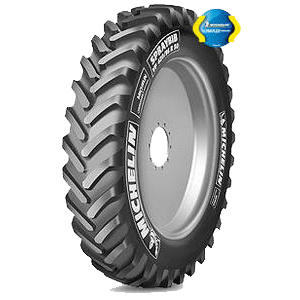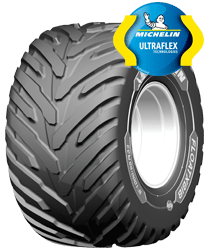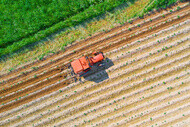
Bias or radial tyres for fertilisation
Crop Treatment: should you use bias or radial tyres?
While the choice between bias or radial tyres is crucial for the entire crop cycle, it is particularly important during the crop treatment phase. As we shall see, choosing one technology over the other can make all the difference in terms of soil protection. Which one will suit your needs? Find out in this article.
The risk of soil compaction
The crop treatment period can be very complicated because of the weather. It's often in wet conditions that you're going to apply crop treatments or fertiliser, which can have a major impact on soil compaction.Soil compaction arises when the soil in the field is loaded beyond its stability level when being driven on, i.e. if the pressure of the tyres on the soil is greater than the counter pressure (the counter-tension of the soil). The proportion of solid substances in the soil structure therefore increases and the proportion of pores.
The best way to limit this is to work at low pressure. In fact, it's recommended that you do this every time you work in the field, even outside the crop treatment period and even in dry conditions. When harvesting, for example, the risk of compaction is also high because the machinery used is heavier and compacts the soil.
But it's when you're working in wet conditions that the risk of compaction is increased. Fortunately, the right choice of tyre technology can reduce this phenomenon.
The difference between bias and radial tyres
Michelin invented radial technology in 1946. Why was this a major innovation? Because the principle of the radial is that the sidewalls are separated from the crown. So when you deflate a radial tyre, the sidewalls flatten out. And because the center of the tyre is separated from the sidewalls, the area of contact with the ground is extended, taking on a rectangular shape.
On a bias tyre, the crown and sidewalls are linked, which gives a domed shape. When the tyre is deflated, this affects the tread as much as the sidewalls, which means that the shape of the contact patch with the ground is elliptical and therefore smaller than on a radial.
The advantage of radial tyres is that by lowering the pressure, the tyre's footprint on the ground is longer , and as the load is spread over a larger surface area, it is less per square centimetre.
How does this longer footprint benefit you? It brings a number of expected benefits:
- less soil compaction
- reduced wheelslip, which means lower fuel consumption, greater productivity and less risk of soil smearing
- greater comfort (the wider distribution of rubber on the ground means better shock absorption)
Do radial tyres last longer than bias tyres?
There are two aspects to tyre life: impact resistance and endurance.
A bias tyre is more resistant to impacts because it is made up of several carcasses. On the other hand, it heats up a lot when it is under heavy stress, particularly during the crop treatment phase when the tanks are heavy and the tyres narrow.
A radial tyre, which has only one carcass, deforms less and dissipates more heat, which makes it better in terms of thermal resistance. They are designed to be more durable than bias tyres, because they have a greater surface area in contact with the ground, which means that the load is distributed more evenly and consequently wears more uniformly, resulting in longer life. A bias tyre, which has an elliptical footprint, is subject to local overpressure, which tends to make it wear more quickly.
Radial tyre + MICHELIN UltraFlex technology = the combination you need
While the advantages of a radial tyre are undeniable, there are further benefits to be enjoyed by chosing radial tyres with Michelin Ultraflex technology.
In fact, a test has shown that between a Michelin radial tyre with MICHELIN Ultraflex technology and a competitor's radial tyre, the MICHELIN SPRAYBIB tyre has 20% more footprint *:
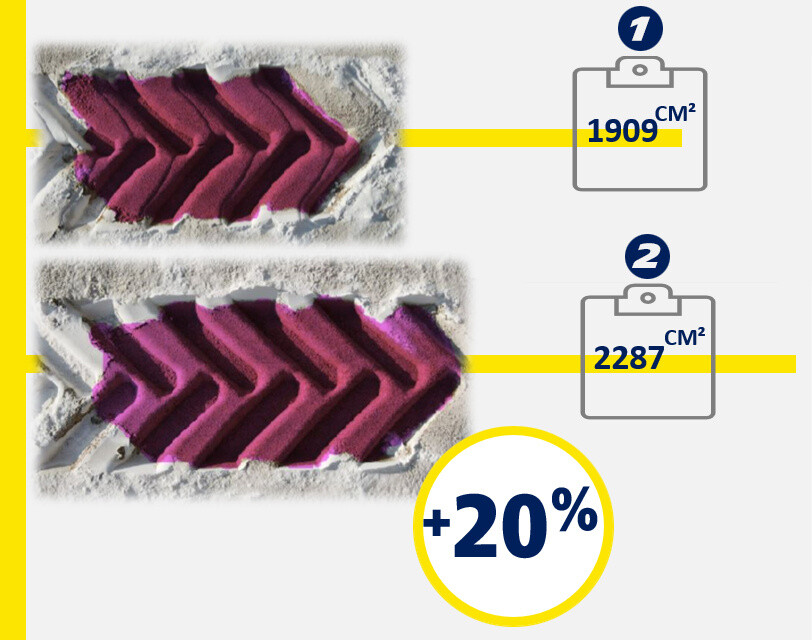
20% more footprint with MICHELIN SPRAYBIB tyre, with MICHELIN UltraFlex and radial technologies (2)
1 : The footprint of a competitor's radial tyre with standard technology (dimension: 380/90 R46 172D/175A8)
2 : The footprint of the MICHELIN SPRAYBIB tyre, a radial tyre of the same dimensions, designed with MICHELIN Ultraflex technology.
In this test*, the competitor's tyre covers 1909 cm2 whereas Michelin Spraybib tyre covers 2287 cm2, which is 20% more ground surface.
In other words, when the competitor's tyre exerts a pressure of more than 27 tonnes per m2 on the ground, the MICHELIN SPRAYBIB tyre should normally reduce it by 4.5 tonnes per m2, which means better soil protection, better traction and fuel savings.

MICHELIN SPRAYBIB radial tyre
Of course, we have several radial tyres with MICHELIN Ultraflex technology, each adapted to your different machines:
- The MICHELIN YIELDBIB tyre for tractors
- The MICHELIN SPRAYBIB tyre for self-propelled sprayers
- The MICHELIN FLOATXBIB tyre for self-propelled spreaders
Save fuel with adapted pressure
The three ranges of MICHELIN Ultraflex radial tyres mentioned above are also compatible with the CTIS (Central Tyre Inflation System)(**). In other words, you can use this system to adjust tyre pressure without leaving the cab of your vehicle, so that it's always at the optimum level for your use.
Optimised tyre pressure means you get all the benefits your tyres are capable of delivering (very low pressure with MICHELIN Ultraflex technology, less soil compaction, better traction) and avoid unnecessary fuel costs.
* Internal Michelin study carried out in Arbonne - France in January 2022. Competitor tyres 380/90 R46 172D/175A8 and MICHELIN SPRAYBIB VF tyres 380/90 R46 CFO 173D/169E. The load per tyre is identical: 5200kg and the pressures used are those recommended by each manufacturer: 3.2b for the competitor tyre and 2.3b for the MICHELIN SPRAYBIB CFO tyre.
** CTIS is only available in certain countries. Ask your dealer for further information.
STAY TUNED
TO THE LATEST NEWS FROM MICHELIN AGRICULTURE!
By providing your email address and clicking on "Send", you agree to receive news and information from Michelin.
You can unsubscribe at any time.
For information on how we process your personal data including on data security, data retention and lawful processing bases, please see our Privacy Policy.
Fields marked with an asterisk (*) are mandatory.
Without these details, we cannot process your request.
We are delighted to have you among us.
Need more advice? Discover our tyre choosing guide.
